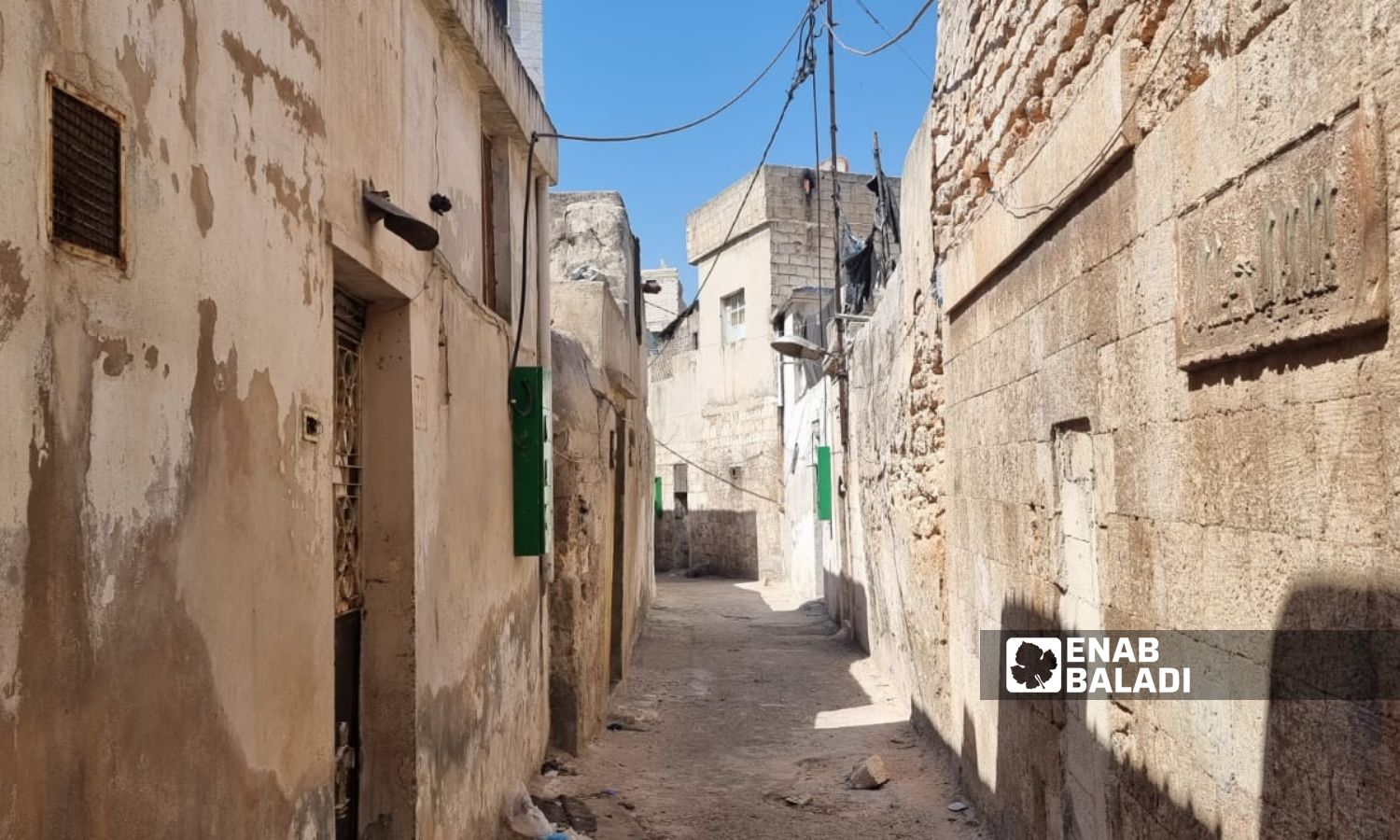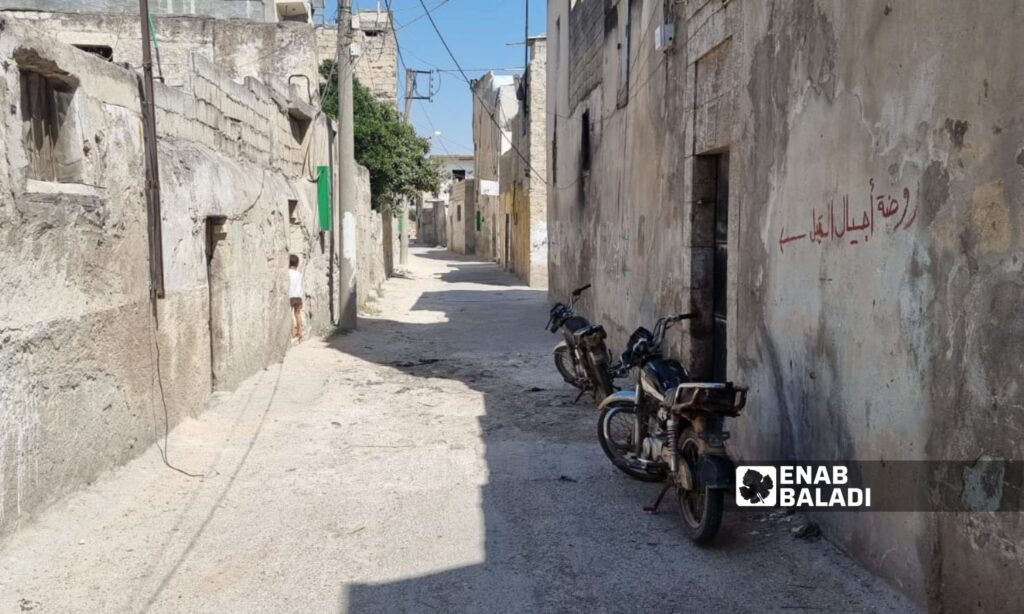Hatem complains about the weak water supply to his home and the refusal of tanker drivers to enter his narrow neighborhood, which makes it difficult for him to secure water for several days, turning his stay into an almost impossible matter.
He can barely fill half of his tank, which has a capacity of seven barrels (1400 liters), and this quantity lasts only five days with severe rationing. After the tank empties, he is forced to stay at his brother’s house until the water returns to his old neighborhood in Idlib where he resides.
Hatem Suleiman, who is displaced from al-Ghouta and lives in the old neighborhoods of Idlib, said that every time he tries to bring in a water tanker to fill his tank, the drivers refuse because the streets are too narrow.
He mentioned to Enab Baladi that water reaches the neighborhood once every eight days and is often very weak, failing to reach some houses, especially if neighbors turn on their water pumps.
Rowaida al-Hassan (54 years old), who also resides in the old neighborhoods of Idlib, suffers from the same problem. She said that getting water to the neighborhood once every eight days is insufficient.
The water crisis has exhausted the residents of Idlib’s old neighborhoods, who have been unable to find solutions to their problem, prompting them to file complaints with the city’s water authority and supporting organizations for water pumping projects. They demanded that water be pumped to these neighborhoods at least two days a week, but all efforts failed.
Adding to the problem is the deterioration and aging of the water extensions, which has created a general state of dissatisfaction among the residents of the old neighborhoods.

Idlib’s old neighborhoods are experiencing significant water shortages and difficulty accessing water tankers – July 31, 2024 (Enab Baladi/Anas al-Khouli)
Water tankers cannot enter
The old neighborhoods of Idlib, located in the northern half of the city, are characterized by their narrow streets, numerous alleys, and high population density. They are considered vital areas due to their proximity to city markets, making vehicle traffic extremely difficult.
The challenging traffic forces drivers to choose alternative routes, especially cargo trucks and water tankers, fearing difficulty in exiting these neighborhoods.
Mohammad Quwedar, a water tanker driver in Idlib, told Enab Baladi that the old neighborhoods in Idlib are narrow, and parking a water tanker in one of the streets completely blocks the road for the duration of its stay.
There are also no spaces to turn around, and during water filling, the tanker might encounter another passing car in the neighborhood, preventing either from exiting.
He added that some neighborhoods are closed at the end, forcing the tanker to reverse for a long distance, which is extremely difficult and risky.
Drivers also fear hitting building walls, especially since these walls are intertwined and not straight. He noted his absolute refusal to enter these neighborhoods regardless of the profits.
Old and corroded water extensions
Another problem causing weak water supply is the deteriorating infrastructure of the networks, with many secondary pipes closed due to their age and the accumulation of lime deposits.
Yazan al-Ahmad (38 years old), who works in plumbing installations in Idlib, told Enab Baladi that the water networks in the old neighborhoods are decades old, explaining that the secondary extensions to homes are closed by 50% to 80%.
Al-Ahmad mentioned that the water in the area is calcareous, leading to the gradual closure of water networks over time, resulting in weak water supply to homes, with some completely closed. He stressed the need to replace the secondary pumping lines.
Idlib’s old neighborhoods are experiencing significant water shortages and difficulty accessing water tankers – July 31, 2024 (Enab Baladi/Anas al-Khouli)
“Water shortage due to waste”
The Public Foundation for Drinking Water, in collaboration with humanitarian organizations funding water pumping projects in the city, divided Idlib into eight sectors to supply drinking water, with a different sector getting water daily. The market sector is the largest.
The Head of the Studies and Supervision Department at the Water Corporation, Engineer Jamal Dibban, told Enab Baladi that drinking water reaches up to 98% of the population.
He mentioned that the reason for the weak water supply in some neighborhoods is the excessive consumption by commercial shops for equipment, street, and shop cleaning, leading to significant waste. He noted the beneficiaries’ lack of interest in conserving water despite repeated recommendations.
Engineer Dibban added that the corporation, in collaboration with humanitarian organizations, worked to increase water pumping hours and operated internal projects like water stations to improve pumping, such as the 30th Street water station and Ghazal water station.
Despite the institution’s efforts to monitor and control waste, the solution lies in raising awareness among citizens about water conservation, urging residents to conserve water and repair internal faults in their homes.
Idlib’s old neighborhoods are considered poor areas, inhabited by many displaced people due to the low rent prices compared to other neighborhoods.
Idlib’s old neighborhoods are experiencing significant water shortages and difficulty accessing water tankers – July 31, 2024 (Enab Baladi/Anas al-Khouli)











